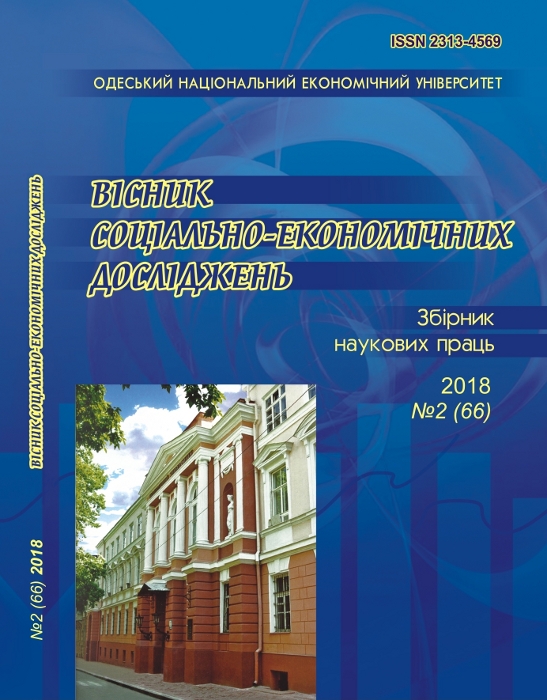Global goods in the structure of public purpose goods
DOI:
https://doi.org/10.33987/vsed.2(66).2018.19-28Keywords:
public goods, global public goods, classification criteria of public goods, conflict between private and public interests in the public goods provision, explicit and implicit needsAbstract
The reasons for the existence of the public goods phenomenon are examined and the universal criteria for their classification are defined in the article. The contradiction between private and public interests, as well as the conflict of explicit and implicit needs are considered as the root causes of existence of classical public goods. It is proved that the objective consequence of these contradictions is the indifference of private business to public goods provision to the society, since the basic characteristics of public goods (non-excludability from consumption and nonrivalry) reduce private benefits in their production. Arguments in favor of the existence of global public goods are given, their place in the system of production of non-market goods is identified. The contradictions in the production of global public goods are highlighted; they include low profitability and high costs for ensuring conditions of «marketability», the absence of an effective regulator in the international arena, whose decisions would be binding for execution, the evasion of public goods consumer from payment for the intake. It is shown that the essential characteristics of the global public goods phenomenon and therefore the contradictions of their production are generated by social relations, which are manifested in the conflict between private, national and global interests. Creation of an effective model for the public goods production is carried out through the formation of a public mechanism for coordinating economic interests in the international space. The existing mechanism for the provision of global public goods, implemented through the activities of international organizations, generates the collective choice problem. It is proposed to solve this problem through the creation of supranational regulatory bodies that will take care of the regulation of those fields of activity that are the most sensitive in terms of the interdependence of economies of different countries.
References
Kaul, I., Grunberg, I., Stern, M. A. (1999). Global public goods: international cooperation in the 21st century, Oxford University Press, Inc., New York, 585 p.
Geuss, R. (2001). Public goods, private goods, Princeton University Press, Princeton, 176 p.
Stiglitz, J. E. (1999). Knowledge as a global public good. Ed.: I. Kaul, I. Grunberg and M. A. Stern. Global public goods: international cooperation in the 21st century, Oxford University Press, Inc., New York, 585 p.
Nordhaus, W. (2006). Paul Samuelson and global public goods. Ed: M. Szenberg, L. Ramrattan and A. A. Gottesman. Samuelsonian economics and the twenty-first century, Oxford University Press, Oxford, 343 p.
Anand, P. B. (2002). Financing the provision of global public goods, United Nations University (UNU), World Institute for Development Economics Research (WIDER) Discussion Paper, No. 110, pp. 48–56.
Sandler, T. (1998). Global and regional public goods: a prognosis for collective action, Fiscal Studies, No. 19 (3), pp. 221–247.
Desai, M. (2003). Public goods: a historical perspective. Ed.: I. Kaul, P. Conceicao, K. Le Goulven, R. U. Mendoza, Providing global public goods. Managing globalization, Oxford University Press, New York, available at: http://www.undp.org/globalpublicgoods/globalization/pdfs/Desai.pdf.
Danilenko, O. L. (2014). Global public goods: problems of provision and international cooperation [Hlobalni suspilni blaha: problemy zabezpechennia ta mizhnarodne spivrobitnytstvo], Visnyk Natsionalnoho universytetu «Yurydychna akademiia Ukrainy im. Yaroslava Mudroho», Seriia Ekonomichna teoriia ta pravo, No. 1, s. 74–85, available at: http://nbuv.gov.ua/UJRN/Vnyua_etp_2014_1_9 [in Ukrainian]
Dlugopolsky, O. V. (2011). Features of public goods financing in the era of global transformations: theoretical and applied aspects [Osoblyvosti finansuvannia suspilnykh blah v epokhu hlobalnykh transformatsii: teoretychni ta prykladni aspekty], Mekhanizm rehuliuvannia ekonomiky, No. 4, s. 113–122 [in Ukrainian]
Konstantyuk, N. I. (2014). Epistemological analysis of public and private goods in the theory of public finance [Hnoseolohichnyi analiz suspilnykh ta pryvatnykh blah v teorii publichnykh finansiv], Sotsialno-ekonomichni problemy i derzhava, Vyp. 1 (10), s. 110–119, available at: http://sepd.tntu.edu.ua/images/stories/pdf/2014/14knitpf.pdf [in Ukrainian]
Buchanan, J. M. (1960). Fiscal theory and political economy, The University of North Carolina, Chapel Hill, 200 p.
Samuelson, P. A. (2004). Net theory of public expenditure [Chistaya teoriya obschestvennykh raskhodov], Vekhi ekonomicheskoy mysli, T. 4, Ekonomicheskaya shkola, Moskva, s. 205–219 [in Russian]
Cowen, T., Henderson, D. R. The concise encyclopedia of economics. Public goods (The library of economics and liberty), available at: http://www.econlib.org.
Smith, A. (2007). An inquiry into the nature and causes of the wealth of nations. Trans. from Eng. Introduction V. S. Afanasyev [Issledovanie o prirode i prichinakh bogatstva narodov; per. s ahgl., predisl. V. S. Afanasyeva], Eksmo, Moskva, 960 s. [in Russian]
Mill, J. S. (2007). Principles of political economy. Trans. from Eng. Introduction М. I. Tugan-Baranovskiy [Osnovy politicheskoy ekonomii; per. s ahgl., predisl. М. I. Tugan-Baranovskogo], Eksmo, Moskva,1040 s. [in Russian]
Pigu, A. (1985). Economic welfare theory. Trans. from Eng. [Ekonomicheskaya teoriya blagosostoyaniya; per. s ahgl.], Progress, Moskva, 512 s. [in Russian]
Musgrave, R. A. (1976). The theory of public finance, McGraw-Hill, New York, 384 s.
Kaul, I., Mendoza, R. U. (2002). Advancing the concept of public goods. Ed.: I. Kaul, P. Conceicao, K. Le Goulven, R. U. Mendoza, Providing global public goods: managing globalization, Oxford University Press, New York, 348 p.
Hans, M. H. (2001). A global public goods approach to a currency transaction tax. Globalization, Oxford University Press, New York, 204 p.
Downloads
Published
Issue
Section
License
Copyright (c) 2018 Socio-Economic Research Bulletin

This work is licensed under a Creative Commons Attribution 4.0 International License.






